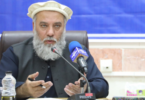KABUL (Tolo News): The Supreme State Council, which the government and political leaders have been working to finalize over the last few weeks, will begin functioning by the end of this week, said Enayatullah Babur Farahmand, an aide to Abdullah Abdullah. He said the council will deal with Afghanistan’s foreign policies among other national issues. This contradicts earlier remarks by President Ashraf Ghani’s national security adviser who said the council will focus only on peace.
The mandate of the council, the number of its members, and whether it will focus exclusively on peace or other national issues have been the main issues debated by politicians who would be members of the council. Ghani’s aides have said the council will have at least 21 members, including four women, while some politicians, including Hekmatyar, have pushed for a smaller number.
“Remarks by some officials indicate a lack of information–the Supreme State Council, which is comprised of influential political Afghan leaders, will have all national issues–including peace, war, the appointment of high-ranking officials and other national issues–as its mandate,” said Enayatullah Babur Farahmand, the deputy head of the High Council for National Reconciliation.
President Ghani’s adviser Akram Khpulwak said the council will have decision-making authority on national issues. He said President Ghani will decide on the date for the first meeting of the council by the end of this week. Gulbuddin Hekmatyar, the leader of Hizb-e-Islami, was expected to be a member of the council but said that he has decided not to be part of it as he faced opposition to his recommendation for an eight-member formation and the limits of the council’s powers.
“So far, they have not succeeded in solving their internal problem. So far, they do not have a unified and clear plan. So far, they have not been able to form a reliable decision-making capability,” said Hekmatyar. Habiba Sarabi, a Republic negotiator who is slated to be member of the council, said the presence of women in the state council would be key to progress in its activities.
“I hope that some politicians who are not so much in agreement on the presence of women consider that women make up half of society and are a complement to it. Human society is incomplete without women. They should remember this and they should not insist on a lesser presence for women in the council,” Sarabi said. The efforts for the formation of the council have been expedited as peace talks in Doha have stalled and violence has remained high in various parts of the country. The Defense Ministry has been reporting clashes in at least 18 provinces on a daily basis over the last two weeks.






